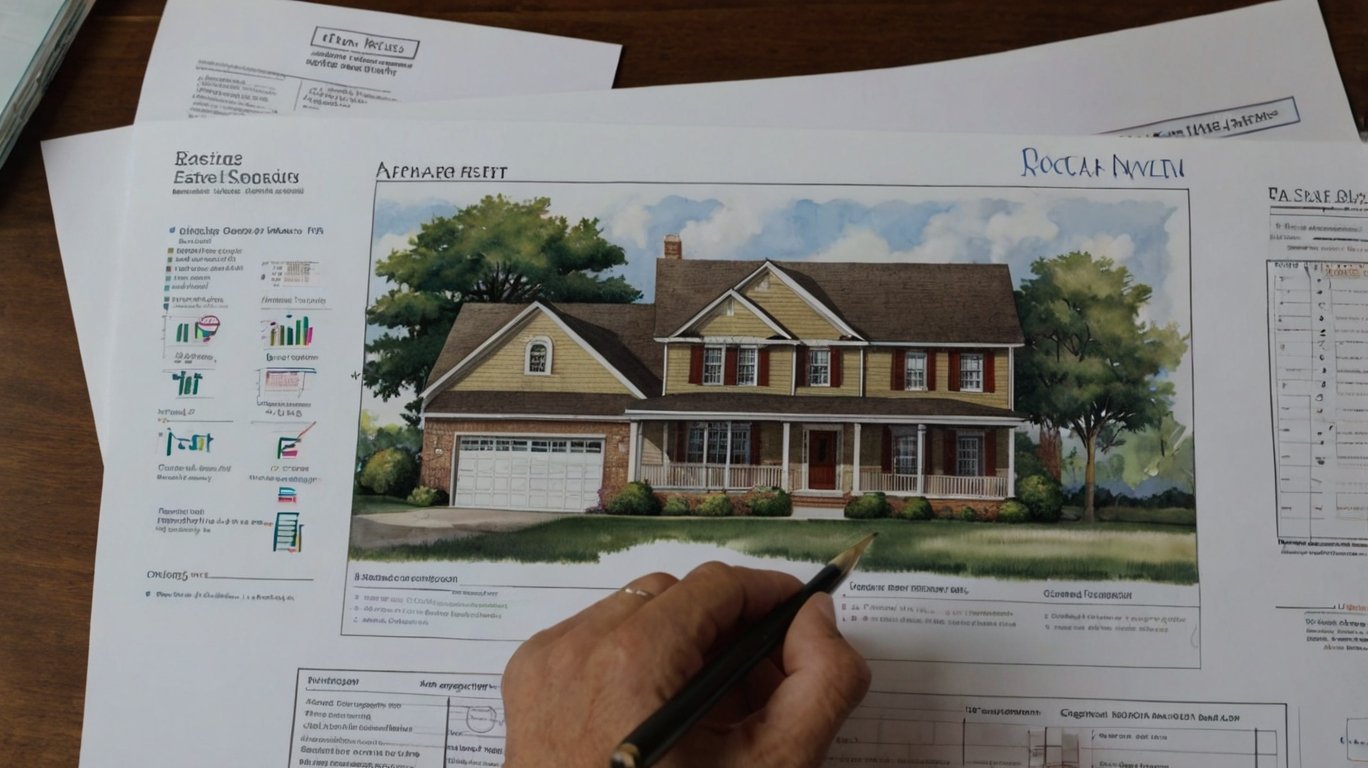Buying or selling a property is one of the most significant financial transactions you’ll ever make, so understanding every aspect of the process is crucial. One key component that often mystifies both buyers and sellers is the real estate appraisal. But what exactly is a real estate appraisal, and why is it so important?
What is a Real Estate Appraisal?
A real estate appraisal is an unbiased estimate of the fair market value of a property. This valuation is determined by a professional appraiser who evaluates the property based on various factors, including its condition, location, and comparable sales in the area. The appraisal is a critical part of the real estate process, as it ensures that the price agreed upon by the buyer and seller is fair and reflective of the property’s true worth.
Why Are Appraisals Important?
Appraisals serve multiple purposes. Whether you’re buying, selling, refinancing, or securing a mortgage, the appraisal provides a reality check. It protects both the buyer and the lender from overpaying or lending more than the property is worth. In essence, an appraisal offers an objective, third-party opinion on the property’s value, making it a crucial safeguard in any real estate transaction.

The Purpose of a Real Estate Appraisal
Determining Market Value
At its core, an appraisal determines the market value of a property. This is not just about what someone is willing to pay but rather what the property is likely to sell for in a fair and open market. This valuation helps set realistic expectations for both buyers and sellers.
Refinancing and Mortgages
When refinancing a mortgage, lenders will often require an appraisal to ensure the new loan amount aligns with the current value of the property. This step is crucial for avoiding over-lending on a property that may have decreased in value since the original purchase.
Buying and Selling Property
For buyers, an appraisal confirms that they’re paying a fair price for a property. For sellers, it validates their asking price. If the appraisal comes in lower than expected, it can lead to renegotiations or even derail the sale altogether.
How the Real Estate Appraisal Process Works
Choosing an Appraiser
The appraisal process begins with selecting a qualified appraiser. Lenders typically have a list of approved appraisers they work with, but it’s essential to ensure the appraiser is licensed and has experience with the type of property being evaluated.
The Inspection Process
The appraiser will conduct a thorough inspection of the property, noting its size, layout, condition, and any improvements or upgrades. This inspection also includes an evaluation of the surrounding neighborhood, which can significantly impact the property’s value.
Analyzing Comparable Sales
After the inspection, the appraiser will compare the property to similar homes that have recently sold in the area. These comparable sales, or “comps,” help the appraiser gauge the property’s value relative to the local market.
Final Appraisal Report
Once all the data is gathered, the appraiser compiles it into a detailed report. This report outlines the appraiser’s findings and provides the final appraised value of the property. The report is then sent to the lender or requesting party for review.

Key Factors That Influence a Real Estate Appraisal
Location of the Property
Location is perhaps the most significant factor in a real estate appraisal. A property’s proximity to amenities, schools, public transportation, and its position within the neighborhood can all influence its value.
Property Size and Condition
The size of the property, including the square footage of both the house and the land, plays a major role in its valuation. Additionally, the condition of the property—whether it’s well-maintained, recently renovated, or in need of repairs—will also affect its appraised value.
Market Conditions
The real estate market’s current state—whether it’s a buyer’s or seller’s market—can impact appraisal values. In a hot market, properties may appraise higher due to increased demand, whereas in a slow market, values might be lower.
Recent Sales in the Area
The sales prices of similar properties in the area provide a benchmark for the appraisal. If comparable homes have sold for high prices recently, the subject property may receive a higher appraisal as well.
Types of Real Estate Appraisals
Sales Comparison Approach
This is the most common method used for residential appraisals. The appraiser compares the property to similar homes that have recently sold, making adjustments for any differences.
Cost Approach
The cost approach estimates what it would cost to replace or reproduce the property at current prices, subtracting any depreciation. This method is often used for new construction or unique properties.
Income Approach
Primarily used for investment properties, the income approach evaluates the property based on its potential to generate income. This method is common in appraising commercial properties like apartment buildings or office spaces.

Common Myths About Real Estate Appraisals
Myth 1: Appraisals Are the Same as Home Inspections
While both appraisals and inspections involve assessing the property, they serve different purposes. An inspection checks for issues like structural damage or necessary repairs, while an appraisal determines the property’s value.
Myth 2: You Can Challenge an Appraisal
If you disagree with an appraisal, you can request a reconsideration of value, but this doesn’t guarantee a change. Appraisers must follow strict guidelines, and challenging an appraisal can be difficult.
Myth 3: The Appraised Value Is Always the Selling Price
The appraised value is an estimate of the property’s worth, but it doesn’t always match the selling price. Market conditions, negotiations, and buyer willingness can lead to a final sale price that’s higher or lower than the appraisal.
Understanding the Appraisal Report
What’s Included in the Report
An appraisal report includes a detailed analysis of the property, the methods used to determine its value, and a final estimate of the property’s worth. It also includes information on the neighborhood and comparable sales.
Interpreting the Appraisal Value
The appraised value is the appraiser’s professional opinion of the property’s worth, but it’s important to understand that this value is not set in stone. It’s a guide for lenders, buyers, and sellers.
What to Do If the Appraisal Is Lower Than Expected
If the appraisal comes in lower than expected, it can impact the financing of the property. In such cases, you might need to renegotiate the price, increase your down payment, or explore other financing options.
The Role of Appraisals in Different Real Estate Transactions
Appraisals in Residential Real Estate
In residential transactions, appraisals ensure that buyers are paying a fair price for a home. Lenders use the appraisal to determine the amount of mortgage they are willing to offer.
Appraisals in Commercial Real Estate
Commercial appraisals are often more complex due to the variety of factors that influence property value, such as income potential, market conditions, and property type.
Appraisals in Investment Properties
For investment properties, appraisals focus on the income-generating potential of the property. This approach helps investors understand the potential return on investment.
How to Prepare for a Real Estate Appraisal
Gathering Necessary Documents
Having all necessary documents ready, such as recent tax assessments, property deeds, and records of recent improvements, can help the appraiser understand the full value of your property.
Making Minor Repairs and Improvements
Minor repairs, like fixing leaky faucets or broken windows, can positively impact the appraisal. Even small upgrades, such as a fresh coat of paint, can make a difference.
Cleaning and Staging Your Property
A clean, well-staged property creates a positive first impression and can influence the appraiser’s assessment of the property’s condition and appeal.
What to Do If You Disagree with the Appraisal
Requesting a Reconsideration of Value
If you believe the appraisal is inaccurate, you can request a reconsideration of value. This involves providing additional information or pointing out errors in the report.
Getting a Second Opinion
Sometimes, it may be worth getting a second appraisal, especially if the first appraisal seems significantly off. However, keep in mind that this can be costly and doesn’t guarantee a different result.
Understanding Your Options
If you’re unhappy with the appraisal, you may need to renegotiate with the buyer or lender. Understanding your options can help you make an informed decision.
The Cost of a Real Estate Appraisal
Average Cost of Appraisals
The cost of a real estate appraisal can vary, but on average, it ranges between $300 and $500 for a single-family home. Larger or more complex properties can cost more.
Factors That Affect Appraisal Costs
Several factors influence the cost of an appraisal, including the property size, location, and complexity of the appraisal process. Unique properties or those in rural areas may also incur higher costs.
Who Pays for the Appraisal?
Typically, the buyer pays for the appraisal as part of the closing costs. However, in some cases, the seller may agree to cover the cost as part of the negotiation process.

How Long Does a Real Estate Appraisal Take?
The Timeline for Completing an Appraisal
An appraisal usually takes about 7 to 10 days from the time of inspection to the delivery of the final report. However, this timeline can vary depending on the appraiser’s workload and the complexity of the property.
Factors That Can Delay the Process
Delays can occur if there are issues accessing the property, problems with documentation, or if the property is unique and requires additional research. Understanding these potential delays can help you plan accordingly.
What to Expect During the Waiting Period
During the waiting period, it’s normal to feel anxious, especially if the appraisal is a critical factor in the sale or refinancing process. Staying in touch with your lender or real estate agent can help you stay informed about the progress.
Appraisal vs. Market Value: What’s the Difference?
Defining Appraisal Value
Appraisal value is the professional estimate of a property’s worth, determined by an appraiser based on specific criteria and methodology. This value is used primarily for lending purposes.
Defining Market Value
Market value, on the other hand, is the price a buyer is willing to pay for a property in an open and competitive market. It can be influenced by factors such as buyer demand and seller motivation.
Why They May Differ
Appraisal value and market value can differ due to the timing of the appraisal, changes in the market, or differences in the appraiser’s and the market’s assessment of the property’s value.
Impact of Appraisals on Mortgage Approval
The Appraisal’s Role in the Mortgage Process
The appraisal plays a crucial role in the mortgage process. Lenders rely on the appraisal to ensure the loan amount doesn’t exceed the property’s value, reducing their risk.
What Happens If the Appraisal Is Lower Than the Loan Amount?
If the appraisal is lower than the loan amount, the lender may require the borrower to make a larger down payment or the deal may fall through if the buyer and seller can’t agree on a new price.
How Lenders Use Appraisal Reports
Lenders use appraisal reports to make informed decisions about loan amounts, interest rates, and terms. The appraisal helps them assess the risk associated with lending on a particular property.
Conclusion
Understanding real estate appraisals is essential for anyone involved in buying, selling, or refinancing property. The appraisal process ensures that the property’s value is accurately reflected, providing protection for both the buyer and the lender. By understanding the factors that influence appraisals, how to prepare, and what to do if you disagree with an appraisal, you can navigate the process with confidence.
Certainly! Here’s a paragraph formatted in a similar style:
Further Reading on Real Estate
For those interested in expanding their knowledge further, here are some valuable resources:
Real Estate vs. Stocks: Which Investment is Better?: Explore the comparative benefits and risks of investing in real estate versus stocks to make informed financial decisions.
How to Evaluate Real Estate Market Conditions: Learn practical tips and strategies for assessing real estate market trends and conditions to better understand your investment landscape.
The Fundamentals of Investing in Real Estate: Where to Begin: This article provides essential steps and considerations for beginners starting their journey in real estate investment.
These resources will enhance your understanding and help you make informed decisions in the real estate market.
FAQs
- How Often Should I Get a Property Appraised?
- Generally, a property only needs to be appraised when buying, selling, or refinancing. However, you might consider an appraisal if there have been significant changes to your property or the market.
- Can I Influence the Appraisal Value?
- While you can’t directly influence the appraised value, you can ensure your property is in the best possible condition, provide accurate information, and present any improvements to the appraiser.
- What Happens If the Appraisal Is Higher Than the Sale Price?
- If the appraisal is higher than the sale price, it’s generally a good thing for the buyer, as it means they’re getting a good deal. The lender will still base the loan amount on the sale price.
- How Is an Appraiser Chosen?
- Lenders usually choose the appraiser, often from a list of approved professionals. It’s essential that the appraiser is licensed and experienced with the type of property being appraised.
- Are There Alternatives to a Full Appraisal?
- Yes, there are alternatives such as automated valuation models (AVMs) or drive-by appraisals, but these are less comprehensive and may not be accepted by all lenders.
